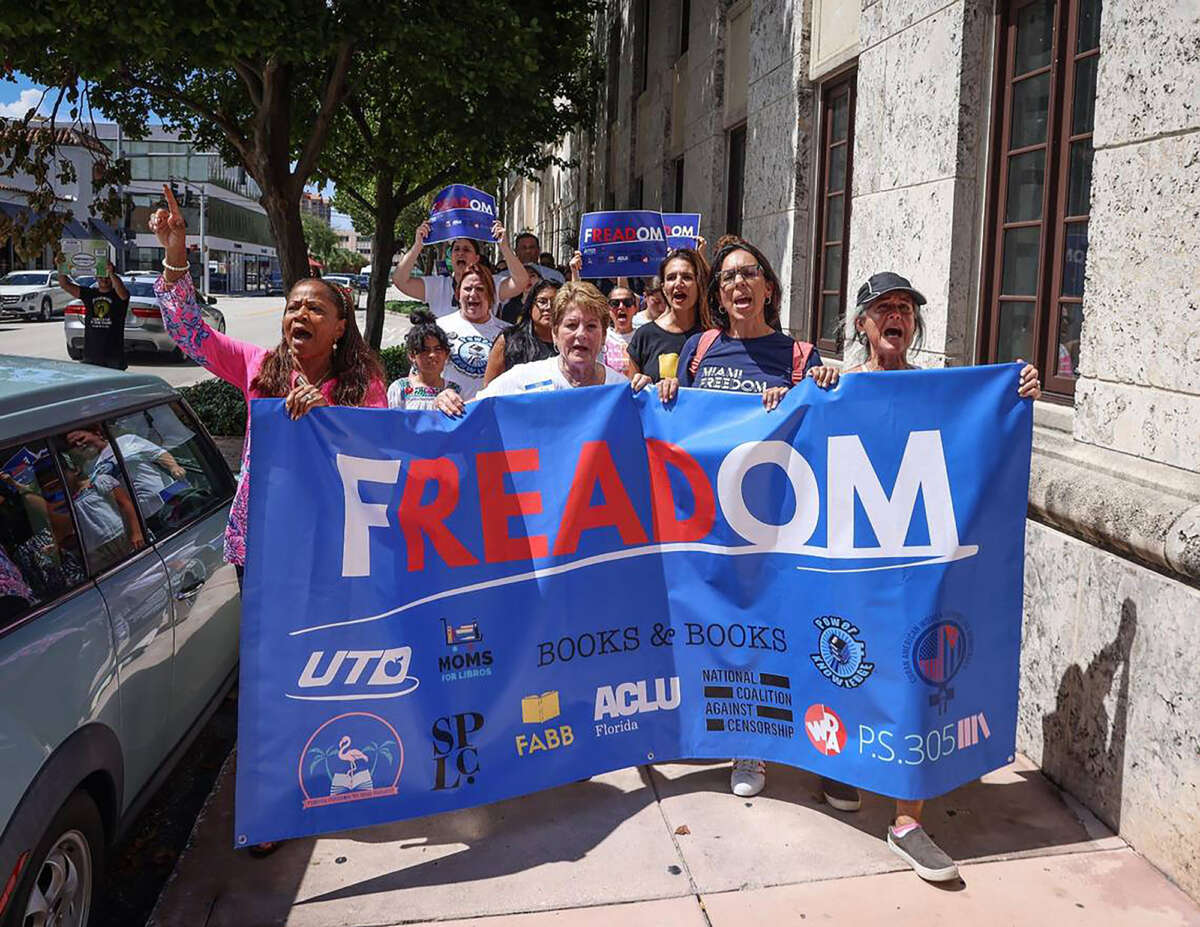Support justice-driven, accurate and transparent news — make a quick donation to Truthout today!
As Banned Books Week kicked off, a leading free expression group in the U.S. announced Monday that the number of books that were pulled from shelves or “challenged” by right-wing groups and Republican lawmakers skyrocketed to at least 10,000 over the last year with state legislatures passing new censorship laws.
PEN America found that the number of banned books tripled from the 2022-23 school year, when it had been 3,362.
New laws passed in Iowa and Florida were major drivers of censorship in libraries and public schools in the last school year, with 8,000 instances of book bans in the two states.
Under Iowa’s S.F. 496, which took effect in July 2023, all materials containing descriptions or depictions of a “sex act” were determined to not be “age-appropriate” for K-12 students. The state banned 14 books from 2021-23, but the strict censorship law — which also bans classroom discussions of LGBTQ+ issues and gender identity — “led to thousands of book bans during the 2023-2024 school year,” said PEN.
Florida’s H.B. 1069 also focuses heavily on books that contain “sexual conduct,” and its statutory review process requires that books be pulled from shelves while the titles are being evaluated after being challenged.
While “coordinated campaigns by a vocal minority of groups and individual actors” that claim to fight for “parents’ rights” made for a “chilled atmosphere of overly cautious decision-making regarding the accessibility of books in public school libraries,” said PEN, state legislation especially accelerated book bans.
Laws like those passed in Florida and Iowa made it “easier to remove books from schools without due process, or in some cases, without any formal process whatsoever,” wrote Kasey Meehan and Sabrina Baêta of the group’s Freedom to Read program. “Over a dozen new laws and state policies used to ban books in schools have been implemented, as have a number of district policies at the local level.”
The organization identified Utah as having “the most extreme state book-banning bill currently in place,” with H.B. 29 establishing what PEN called a “No Read List.”
If any three school districts in Utah find that a title includes “objectively sensitive material,” the book must be banned in all schools across the state.
The law went into effect in July and “is expected to result in significant book bans during the 2024-2025 school year.”
PEN’s analysis came out as the American Library Association (ALA) unveiled its own preliminary findings about banned books for the first eight months of 2024. While PEN considers a title to be “banned” if it is pulled from shelves at any point, even if access is later restored after review, the ALA counts books as banned only if they are permanently censored.
Using that criteria, the ALA found that from January 1-August 31, 2024, 414 challenges were made to 1,128 unique titles — compared to 695 challenges over the same period last year, affecting 1,915 titles.
Both the ALA and PEN said their tallies were likely undercounts of banned books.
PEN found that 13 books were banned in the last school year for the first time, including A Tree Grows in Brooklyn by Betty Smith, Black Reconstruction in America, 1860-1880 by W.E.B. DuBois, Roots: The Saga of An American Family by Alex Haley, and How the Garcia Girls Lost Their Accents by Julia Alvarez.
The two analyses came out days after the Nationhood Lab at Salve Regina University’s Pell Center published a poll showing, as program director Colin Woodard said, that “Americans, regardless of party, really hate public library book banning.”
NEW: Americans, regardless of party, really hate public library book banning. Results from our Nationhood Lab @SalveRegina poll "stress testing" public commitment to liberal democratic values: https://t.co/zhS3LlJ0Bj pic.twitter.com/V4HkZGPk8r
— Colin Woodard (@WoodardColin) September 18, 2024
Sixty-six percent of respondents to the group’s poll said they strongly opposed the censorship of books, including 90% of Democrats and 64% of independents.
Fifty-three percent of Republicans said they either strongly opposed or somewhat opposed book bans.
Despite the unpopularity of the bans, PEN warned that Republican-controlled state legislatures are likely to forge ahead in the coming months with more laws blocking people’s access to books, particularly those that have themes related to LGBTQ+ identities, race and racism, and women’s sexual experiences.
In South Carolina, the newly passed Regulations 43-170 prohibit books with “sex-related content” and empower the state Board of Education to ban books across the state, while in Tennessee, the Age-Appropriate Materials Act of 2022 just took effect in July. The law “requires schools to remove books that contain nudity, ‘excess violence,’ or sex-related content,” and allows a state commission to evaluate possible book bans.
Press freedom is under attack
As Trump cracks down on political speech, independent media is increasingly necessary.
Truthout produces reporting you won’t see in the mainstream: journalism from the frontlines of global conflict, interviews with grassroots movement leaders, high-quality legal analysis and more.
Our work is possible thanks to reader support. Help Truthout catalyze change and social justice — make a tax-deductible monthly or one-time donation today.
